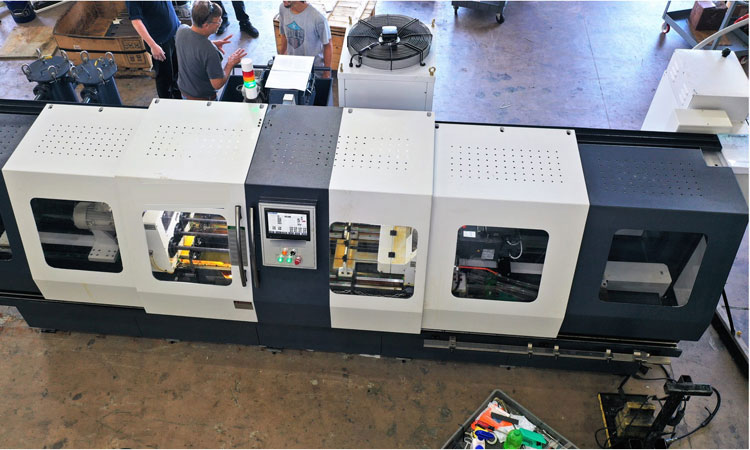The international deep-hole drilling gadget market exhibited moderate growth during the period of 2015-2020. In the years, the industry experts expect the market to grow at a CAGR of around five per cent during 2021-2026. The medical fraternity says these insights are included in a related report as a major market contributor.
A deep-hole drilling machine is a mechanical gadget used for cutting through metals in very deep and precise holes. The gadget can be applied on various metals, for instance alloy and stainless steel, aluminium, titanium, cast iron and copper alloys and consists of a cutting tool, or a drill, which is fixed into the spindle internal taper.
Apart from the factors mentioned above, including rapid industrialisation, along with the increasing adoption of automation and advancements in manufacturing processes, are expected to boost the market toward growth.
Generally, conventional machine tool OEMs can help medical manufacturers produce highly intricate and precise components such as surgical implants and tools. However, only an experienced and capable gundrilling machine OEM with a deep insight into the challenges of stringent medical part drilling requirements can supply a truly effective solution.
For contemporary medical parts, manufacturers make impossible holes possible with reliable, highly productive and automated gundrilling processes. Such solutions allow medical manufacturers to overcome the challenges of machine parts and meet demands for higher volumes and cost reductions, while they also improve part quality and ease the pressures of labour issues where there’s either not enough of it or costs more.

The contemporary scientific amalgamation of integrated solutions with technical expertise sorts your medical gundrilling problems and allows you to produce very difficult holes, especially when dealing with:
- Tiny holes with extreme depth-to-diameter ratios and tight tolerances
- Difficult materials such as stainless steel, and titanium
- Thin-walled parts of the machine
- Irregular OD parts that require multi-step operations
It’s not only about just any gundrilling system provider which can drill an impossible hole relatively perfectly. It also takes a single-minded devotion to research, continuous improvement and collaboration in the process. In fact, sealing an OEM to collaborate to solve complex problems can give the confidence to integrate gundrilling into a medical part production and use it to its optimum potential in the long run.
The automation-ready gundrilling machine the company’s design ensures a solid foundation for reliable, process-wide automation. Moreover, flexible functional configurations such as our lantern chuck and other peripheral components make robotic integration even more suitable for medical gundrilling applications.
While automation helps ease labour issues, today’s medical part manufacturers still face numerous challenges, from stiff competition and constantly increasing production demands to cost control. However, drilling deep holes in tough medical components is one industry challenge that is forever improved thanks to technology, a company that makes drilling the impossible holes possible.
Mould making isn’t a very easy job. There are several intricate processes that include: highly complicated geometry with 2D and 3D features, managing a wide range of part sizes, and brief lead times on small quantities and latest completely error-free designs. Adding to these challenges is the pressure to keep up with the rapid pace of demand and technology.
However, there’s a means to overcome those hurdles: Do better work with technology designed specifically for complex mould making.
The latest series of milling and drilling centres allow you to drill faster and mill better with a single machine and fewer set-ups. Such milling and drilling centres overcome the challenges of milling and gundrilling of all types of metals with either a single universal combination spindle or dedicated milling and drilling spindles. Utilising high-performance spindles that provide exceptional rigidity and power transmission, these machines deliver high-torque milling capability for aggressive metal removal and shorter cycle times. Additionally, five-axis positioning enables mould manufacturers to tackle complex geometries with impressive precision in a single set-up.
Several producers claim to provide milling and drilling in a single machine, but the fact remains, those hybrid machines neither mill nor drill good enough to make any significant difference in either operation. Effectively, one process is an afterthought of the other. The cutting-edge machines, however, was designed from the beginning to act as a single unit machine with superior milling and drilling abilities and accuracy. State-of-the-art milling technology is embedded into a machine that has the power, thrust, speed and process monitoring competitors thought would be almost impossible to attain, or simply not feasible.

Additionally, to superior quality and accuracy, the pay-off for single set-up milling and drilling is efficiency and an improved bottom-line. Mould makers cut delivery times to their customers with faster set-ups and production along with decreased overall labour costs. Once they move away from mould making operations with two machines, most of our customers find they can’t afford to manufacture without the tech from USC-M-series milling and drilling centre.
The gains of milling better and drilling faster with a particular series of machines are not limited to the spindle. There are intangible benefits as well. For example, UNISIG USC-M series milling and drilling centres allow mould manufacturers to approach their work differently and explore multiple approaches to mould making. With the entire manufacturing process streamlined, customers find their engineers and design teams enjoy more freedom and flexibility with the expanded capabilities. Finishing and assembly are faster because the design is more efficient, and manufacturers can do things effortlessly that were struggling with previously.
Ultimately, it’s about setting the bar high enough and keeping it there. For instance, a manufacturer like UNISIG sets a standard looked up to by the competition. It’s a state-of-the-art mindset that takes mould finishing to a new level with a machine that allows you to mill better and drill faster.


